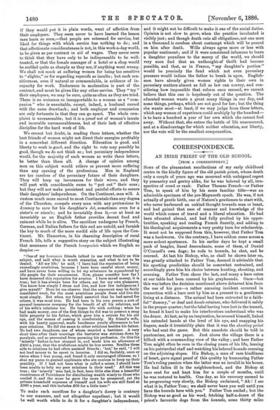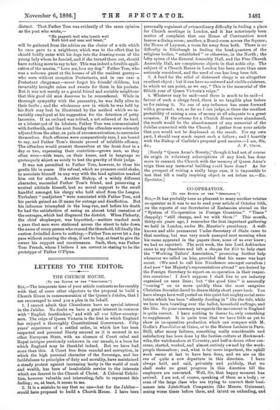CORRESPONDENCE.
AN IRISH PRIEST OF THE OLD SCHOOL.
[FROM A CORRESPONDENT.] SOME of the pleasantest recollections of my early childhood centre in the kindly figure of the old parish priest, whose death only a couple of years ago was mourned with unfeigned regret by peasantry and gentry alike, for he was beloved by all, irre- spective of creed or rank. Father Thomas French—or Father Tom, to speak of him by his more familiar title—was an admirable specimen of the pre-Maynooth epoch. He was, if not actually of gentle birth, one of Nature's gentlemen to start with, who never harboured an unkind thought towards man or beast, and had gained that ease of manner and knowledge of the world which comes of travel and a liberal education. He had been educated abroad, and had fully profited by his oppor- tunities, speaking and reading French fluently, and adding to his theological acquirements a very pretty turn for scholarship. It must not be supposed from this, however, that Father Tom was a bookworm. On the contrary, I have seldom come across a more ardent sportsman. In his earlier days be kept a small pack of beagles, lineal descendants, some of them, of Daniel O'Connell's own dogs ; he rode to hounds, he shot, and he coursed. At last his Bishop, who, as shall be shown later on, was greatly attached to Father Tom, deemed it advisable that his sporting proclivities should be somewhat restrained, and accordingly gave him his choice between hunting, shooting, and coursing. Father Tom chose the last, and many a bare eaten at our table had been coursed by his greyhounds. Once—but this was before the decision mentioned above debarred him from the use of his gun—a rather amusing incident occurred in connection with a hare sent by him as a present to a gentleman living at a distance. The animal had been entrusted to a faith- ful" dummy," or deaf and dumb retainer, who delivered it safely in the proper quarter; but the label having been lost in the transit, he found it hard to make his interlocutors understand who was the donor. At last, as by an inspiration, he crossed himself, linked his extended hands at the level of his eye, and snapping his fingers, made it irresistibly plain that it was the shooting priest who had sent the game. But this anecdote should be told in pantomime, not on paper. Just above the village there is a hillock with a commanding view of the valley ; and here Father Tom might often be seen in the closing years of his life, leaning on his patriarchal staff and watching his beloved hounds coursing on the adjoining slopes. His Bishop, a man of rare kindliness of heart, gave signal proof of this quality by humouring Father Tom's ruling passion when the latter was an invalid in his house. He had fallen ill in the neighbourhood, and the Bishop at once sent for and kept him for a couple of months, until he was restored to health. One day, as his recovery seemed to be progressing very slowly, the Bishop exclaimed, " Ah ! I see what it is, Father Tom ; we shall never have you well until you have the hounds here with you." Father Tom smiled ; but the Bishop was as good as his word, fetching half-a-dozen of the priest's favourite dogs from the kennels, some thirty miles
.distant. That Father Tom was evidently of the same opinion as the poet who wrote,—
"He prayeth well who loveth well Both bird and man and beast,"
will be gathered from the advice on the choice of a wife which he once gave to a neighbour, which was to the effect that he should boldly enter with his dogs into the drawing-room of the young lady whom he fancied, and if she turned them out, should have nothing more to say to her. This was indeed a forcible appli- cation of the maxim, " Love me, love my dog." Father Tom, who was a welcome guest at the houses of all the resident gentry— who were without exception Protestants, and in one case a Protestant clergyman—never forgot his friends' children, but invariably brought cakes and sweets for them in his pockets. But it was not merely as a genial friend and sociable neighbour that this good old man deserves to be remembered. While in thorough sympathy with the peasantry, he was, fully alive to their faults ; and the wholesome awe in which he was held by his flock may best be illustrated by the method which we in- variably employed at his suggestion for the detection of petty larcenies. If an orchard was robbed, a net relieved of its haul, or a lobster-pot of its lobsters, Father Tom was communicated with forthwith, and the next Sunday the offenders were solemnly adjured from the altar, on pain of excommunication, to surrender themselves. Such offences were comparatively rare, I am bound to say, and Father Tom's threats proved of infallible efficacy. The offenders would present themselves at the front door in a day or two, expressing their contrition—grown men, as they often were—with tears, on their knees, and in language so -grotesquely abject as sorely to test the gravity of their judge.
It was not permitted to Father Tom, however, to close his gentle life in peace. His refusal, which no pressure could shake, to associate himself in any way with the land agitation marked him out for attack. Another Bishop, of a widely different character, succeeded Father Tom's friend, and preserving a neutral attitude himself, lent no moral support to the small handful amongst his clergy who held aloof from the League. Turbulent "coadjutors " were associated with Father Tom, and his parish gained an ill name for outrage and disaffection. But his influence triumphed in the long-run, and before his death the had the satisfaction of seeing an almost total cessation of the outrages, which had disgraced the district. When Flaherty, the chief shopkeeper, was boycotted,—matters reached such a pass that men were stationed across the street to take down the name of every person who crossed the threshold, till finally the custom dwindled down to nothing,—Father Tom never let a day pass without entering the shop, if not to buy, at least to give the owner his support and countenance. Such, then, was Father Tom French, whom I believe I am correct in stating to be the prototype of Father O'Flynn.















































 Previous page
Previous page